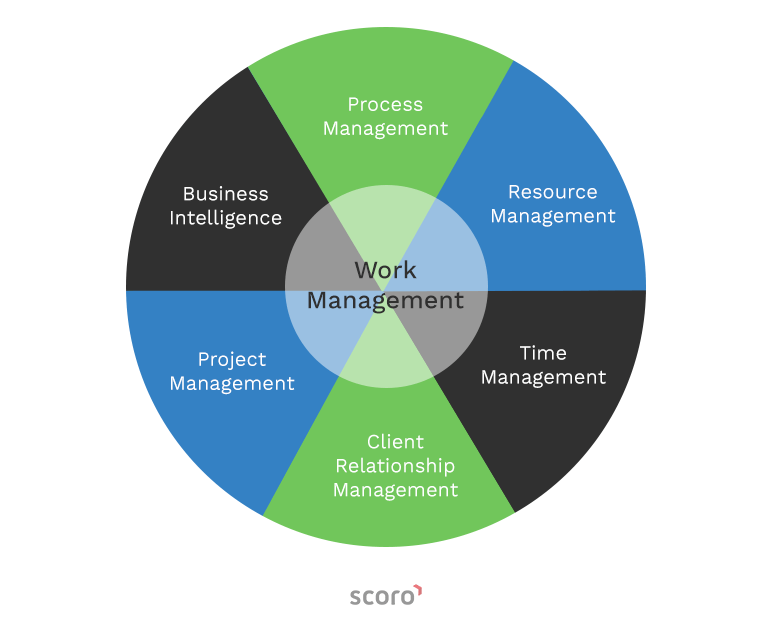WORK MANAGEMENT
Definition :



Definition :
Gartner, the world’s leading information technology research and advisory company, defines work management as a set of services that apply workflow structure to the movement of information and the interaction of business processes and human worker processes that generate the information.
Translation:
work management applies to managing individual and team workflows and workload – whether within the scope of a project or related to organisational operations.

Work management transforms and streamlines crucial business processes by integrating processes and procedures that help the organisation:
- schedule work more efficiently
- meet clients’ needs
- utilise assets and resources
- evaluate performance
These practices result in:
- improved business agility
- boosted performance and results
- minimised redundancy
- reduced waste
- higher efficiency

Work management features:
|
|
|
|
|
|
|
|
|
|
Work management is about integrating a number of different features into one easily comprehensive system, no matter the use case.
Work Management includes the integrated processes and procedures that help the organisation schedule work more efficiently, meet consumer’s needs, utilize assets and evaluate performance.
Features of Work Management
As an enterprise-wide process, Work Management standardizes the entry point of all ‘work’ done within organisation. Whether the work is capitalized or not, it will have a common origin, common number used to track, and be traceable throughout the service Order and Cost Accounting Systems. This allows for better customer services, estimates to actual comparisons, and more accurate bench-marking. We can more readily attain the actual cost of work completed when there is commonality through all systems.
.A task-based design insures that jobs won’t fall through the cracks by utilizing a customized list of steps or task, for each service order type or contact tracking reason established. A task duration setting establishes normal response times for each task and summarizes the task duration to provide the overall target date for service order. Besides these two methods of task creation, ‘Ad Hoc’ tasks can be added unrelated to a customer, service order or contact tracking reason.
The Work Queue provides an online task filtering tool allowing tasks to be viewed, schedule, assigned and completed by a multitude of options. The Work Queue also provides a personalized ‘To Do’ lists for each employee to work form.
One of the most important features is the ability to established Work Management Groups. The Work Management Group is used to define groups of resources along with the task that they commonly perform. The creation of this grouping allows for streamlining assignments of the appropriate people and equipment to the work they needed to do. The reporting by these groups provides greater bench-marking ability, as well as consistency in accounting for work done. Tasks are assigned by default to specific Work Groups, but in addition, can be assigned to individual employees, vehicles and crews through the Work Queue.
Work Management Challenges
In today’s tech world, managers need to deliver services that outperform their competitors in quality. Being a good manager is one of the most difficult responsibilities in the world. Managers get to hear a lot about management from people, but nobody realizes that it is not an easy job. With a complex approach to the modern workplace, there are many challenges that managers have faced over the decades. Here are some challenges managers are majorly facing today.
1. Allocation of a task to teams
Work organization is the first step that comes up with a new project. It brings with it the possibility of skipping a step to make an efficient delivery system for fewer mistakes. The managers usually have to take care of the allocations to make sure that the work is being assigned to the right person at the right time and is completed in the right manner.
Unwanted tasks leads to cripple productivity.
2. Clearing the line between urgent and important tasks
With managing the work, comes the trouble of drawing a line between urgent and important tasks. When a new project comes up, it becomes difficult to always be a person who says yes to whatever comes up. And this happens when there is no proper work management system.
3. Defining a finish date for the task
Giving project tasks a finish date is the need of every project manager. Every team member needs to have a deadline attached to it so the task doesn’t get delayed. So, a manager should have the right experience and knowledge to set the right finish date for the task.
4. Having a clear conversation with clients
The managers usually fail to have a transparent conversation between clients and team members. They fail to update the client or the team members about the priorities every day. And, they happen to get their team into trouble.
In an attempt to better manage the work, it’s all about overcoming the challenges to create a task management system that promotes overall success of the team.


No comments:
Post a Comment